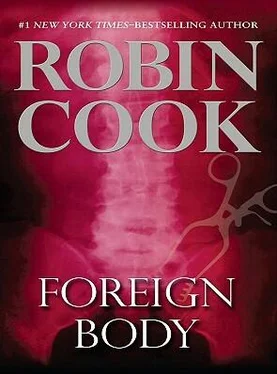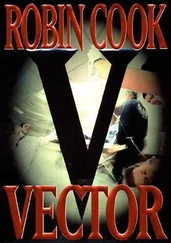Realizing she could not delay any longer, Jennifer grabbed the edge of the sheet and, fighting back tears, pulled the cloth up to expose her grandmother’s face. At first the shock was that she looked so normal. She appeared to be the warm, generous, white-haired grandmother and the always-sympathetic and in-your-corner-no-matter-what stalwart that Jennifer had known. But then when Jennifer looked more closely, it wasn’t fluorescent light that made her skin and lips the color of alabaster except along the side of her neck where there was dark purple lividity. Her color was truly a lifeless, translucent, blotchy, peachlike tan, and she was without a doubt dead.
In keeping with her fragile emotions, Jennifer’s sadness switched back to anger. She let the sheet drop and looked back at Kashmira Varini, and the woman’s false sympathy irritated her further. Jennifer walked out of the cooler and watched Kashmira struggle to close the heavy door. Jennifer didn’t offer to help.
“There!” Kashmira said, standing up straight and wiping her hands after the door had clicked shut. “You can see why you need to come to a decision for your loved one. She can’t stay here any longer.”
“Is there a death certificate?” Jennifer asked, seemingly out of the blue but more because Mr. Benfatti’s fate suddenly reoccurred to her.
“Most definitely. There would have to be a death certificate if either cremation or embalming were being considered. The death certificate was signed by Mrs. Maria Hernandez’s primary surgeon.”
“And the cause of death was definitely a heart attack?”
“It was!”
“What caused the heart attack?”
For several seconds, Kashmira stared back at Jennifer. Jennifer couldn’t tell if the woman was shocked, irritated, or simply frustrated by Jennifer’s question or by what might appear to her as Jennifer’s foot-dragging regarding the body deposition.
“I don’t know what caused your grandmother’s heart attack. I’m not a doctor.”
“I’m about to become a doctor, and I can’t imagine either what could have caused her to have a heart attack. Her heart was literally and figuratively one of her best features in lots of ways. What about an autopsy? Did anyone think of that? I mean, if the doctors don’t know what happened to their patient, they usually want to know, and that’s a good indication for an autopsy.”
Kashmira was surprised at such a suggestion, but so was Jennifer. Up until the moment Jennifer had said it, she’d not considered an autopsy, nor did she even know she wanted one. She’d said it more for Kashmira’s sake, and probably because Kashmira and maybe even the hospital were trying to bully her into making a decision. Autopsy, cremation, and even embalming were violent events, and Jennifer hated to think she was somehow responsible, no matter how irrational such a feeling was. But there was also a new thought as well: How similar was Herbert Benfatti’s death to Maria’s, and could both have been prevented?
“The police or a magistrate are the only people in India that can ask for an autopsy, not the doctor.”
“You’re joking.”
“I’m certainly not joking.”
“That’s like asking for collusion between the police and the magistrates, if you ask me. What about learning something from my grandmother’s passing, something that could keep another, future patient alive? I mean, after all, you had a pretty similar death again last night. If they knew what had caused my grandmother’s heart attack, could Mr. Benfatti’s heart attack possibly have been prevented and the man saved?”
“I don’t know anything about a Mr. Benfatti,” Kashmira responded, almost too quickly. “What I know is that we have a body in this cooler, which has been in there too long and has to be removed. Our experience is that families claim bodies immediately, so we have to reach a resolution now. As you can plainly see, the body cannot stay in here. It’s simply not meant for bodies, and the body has been in here since Monday night.”
“That is your problem,” Jennifer said. “I’m shocked your hospital doesn’t have better mortuary facilities. I just got here to India after flying for almost twenty-four hours, and I’m just learning the details. My difficulty is that I’m mentally and physically exhausted. I’m going to go back to my hotel and sleep for a few hours before I make my decision. I’m also going to visit my embassy and talk to them about logistics. I know you feel confident what they are going to say, but I don’t, and I like to hear such things from the horse’s mouth.”
“The horse’s mouth?” Kashmira questioned.
“It’s an expression. It means directly from the person or persons involved. I’m going to take a nap, visit the American embassy if I can, and then I’ll come back.”
“That’s too late. A decision has to be made now.”
“Listen, Ms. Varini, to be honest, I’m getting a bad feeling here like I’m being pushed too hard. And now with this second death last night, which seems a wee bit too similar to my granny’s, I’m even less likely to make a hasty decision. I mean, you say you don’t know anything about it, which is probably true, but I want to know something about it. It’s too close to my grandmother’s death and sounds too similar.”
“I’m sorry, but other people’s records are confidential. And in regard to yourself, I was specifically told that I had to obtain your decision this morning. We simply cannot have your grandmother’s body in this cooler another hour.” For emphasis, Kashmira reached out a hand and made renewed contact with the cooler’s door. “If you are not willing to cooperate, I’m afraid you will have to speak with our president directly, because he has the authority to speak to a magistrate and petition the court to make the decision for you.”
“I’m not speaking with anyone for a few hours,” Jennifer snapped back. Now she was truly angry. Earlier, she had the opinion Queen Victoria Hospital was trying to push her, and now she was sure of it. Although on the one hand such an action was understandable because of their lack of proper storage, on the other hand it seemed provocative, especially their unwillingness to even consider an autopsy if she expressly indicated she wanted one. “I’ll give you a call when I’m able to think a little better, and I’ll come back. Meanwhile, let me warn you people: Don’t defile my grandmother’s body without my permission unless you are willing to deal with one very unhappy camper.”
“An unhappy camper?” Kashmira questioned, totally confused.
Jennifer rolled her eyes. “It means someone who’s really pissed.”
October 17, 2007
Wednesday, 9:45 a.m.
Delhi, India
Jennifer stared out the Mercedes’s window. She was so embroiled in her own thoughts she didn’t even notice the traffic. The reality was that she had been what she called “pissed” far sooner than she’d admitted. There was no doubt Queen Victoria Hospital was jerking her around, and having been a victim long enough in her relatively short life, she didn’t relish the role. Breaking out of the role had been her major challenge. The seminal event had occurred in middle school, where truancy and fighting had become the rule for her. At loose ends, her grandmother, who had been a particularly proud woman, did something she normally would not have done: She begged for someone’s help. The person she turned to was Dr. Laurie Montgomery, a New York medical examiner whom the grandmother had practically raised from age one to age thirteen as her nanny.
At the time Jennifer had found it big-time weird to meet a stranger who called her own grandmother “Granny.” But Granny had been Laurie Montgomery’s nanny for twelve years. Not surprisingly, Dr. Montgomery had fallen in love with Granny and considered her family. So when Jennifer’s demons drove her over the cliff, Granny pleaded with Laurie Montgomery to try to stop Jennifer’s downward spiral.
Читать дальше












